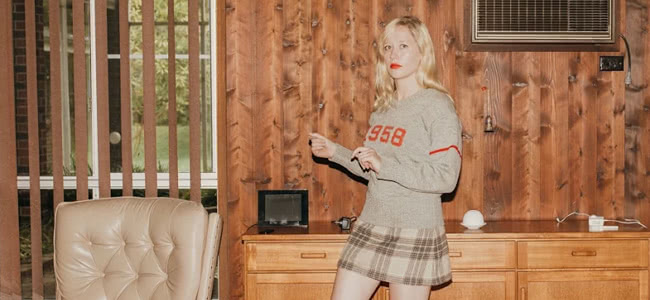If you were to one day make a coming of age biopic about Julia Jacklin, the best scene would look something like this. The then-unknown singer-songwriter would stride across the essential oils factory where she worked and into the office of her boss – probably a gruff, balding man. She’d then exclaim, loudly enough so that all her colleagues could hear, “I quit! I’m never coming back here again.”
But as Jacklin tells us over the phone from Newcastle in northern England, her transition this year from part-time factory worker to Next Big Thing was not quite so clear-cut.
“I didn’t actually quit properly,” she explains. “I just said, ‘I need some time off to go on this tour down to Melbourne.’ And then my manager said, ‘Well, you’re going to start international touring soon so you might as well just not go back to work.’ So it was just a phone call.”
“Actually my boss and my colleagues were really cool and super supportive. They were the ones going, ‘Yes! You don’t have to work here anymore.’ Everyone was happy about that. It wouldn’t have been me throwing my hat down, saying, ‘I’m out of here, losers!’”
Everything has come together for Jacklin this year. The Blue Mountains artist played around Sydney for “about five years” – first with the folk trio Mountain Man and then by herself – but like, say Courtney Barnett, to the rest of us her rise has seemed awfully sudden.

It began with positive reviews from the influential overseas music press after a few well-received shows at South by Southwest. Her debut album, Don’t Let The Kids Win, which marries folk and country sounds to Jacklin’s soaring voice and her wry, reflective and observational lyrics, was released to critical acclaim in October. You can expect to find it included in many end-of-year best album lists in the coming months.
“I wasn’t really thinking too much about expectations when I made it,” Jacklin says of the record, which she recorded over three weeks in New Zealand. “I was just hoping I wouldn’t have to release it on my own. That was the biggest thing. I didn’t want to invest all this time and money into it and then have no one hear it except Mum.”
Instead, when she speaks with Tone Deaf, Jacklin already finds herself on a European tour. On the phone, she is thoughtful, and often funny – you can imagine her acting out her anecdotes with her hands as she talks. But she also sounds a bit road weary.
“I never thought that I’d be touring this much early on, for sure,” she says. Although it’s been more long car rides and service station food than raucous parties, there have already been moments she would only have dreamed about a year ago. Last night, for example, she received her first fan letter.
“It was just gushing, telling me that they really liked the record and it had lots of interesting drawings,” Jacklin says.
“It’s nice to get to the point where people are telling you how they’ve connected with [the album]. I went to so many gigs when I was younger and nervously went up to the person and kind of said something really weird to them, trying to express how much their record meant to me. It’s pretty cool to have that happen to me.”
She recalls meeting one of her own heroes, Grinspoon’s Phil Jamieson, at the age of 13. There was no letter. Instead, she just screamed. “I wasn’t an articulate human being just then,” she laughs. “I just screamed and said something like, ‘Your music is my world!’ I was a huge Grinspoon fan when I was young.”
Jacklin’s musical journey is not easily pigeonholed. She cites Britney Spears as her inspiration for taking up singing lessons as a child. When she was older, she developed a love of Appalachian folk, which – along with Mountain Man bandmate Liz Hughes – provided the spark she needed to start write her own songs.

Aside from Hughes, the other key figure in Jacklin’s development was Melbourne musician Adrian Slattery. The Big Smoke singer lost his battle with cancer earlier this year, prompting a moving Facebook post from Jacklin that revealed how Slattery had encouraged her during a disastrous first show in Melbourne.
“When I met him, I was pretty young and I didn’t know how to be a musician,” she says. “I felt quite embarrassed by it, I guess. I thought people were going, ‘Oh yeah, that’s never going to happen. You’re an idiot.’
“He was 100 per cent not like that. He had that attitude of just, ‘Who cares what people think? If this is what you want to do. Just do it. Get over yourself.’ That gave me a lot of inspiration to think, ‘Well if he’s doing it, I’m going to do it.’”
Jacklin readily admits she is still trying to figure out how to be a musician. The only difference is there’s a fanbase watching on as she grapples with those choices.
The next major question will be how she plans to follow up Don’t Let The Kids Win. It’s not something Jacklin is too keen to ponder just yet.
“It’s kind of crazy that I’m being asked that question now,” she says, more bemused than frustrated. “It’s totally fair and I think about it a lot. I’m still trying to process this whole thing, I guess. I don’t really have any space in my brain to think about my next project..”
“I think, for everyone, the second record is a cause of fear. So I’m trying to enjoy what I’m doing right now. I’ll wait a little while before I freak out about it.”




































